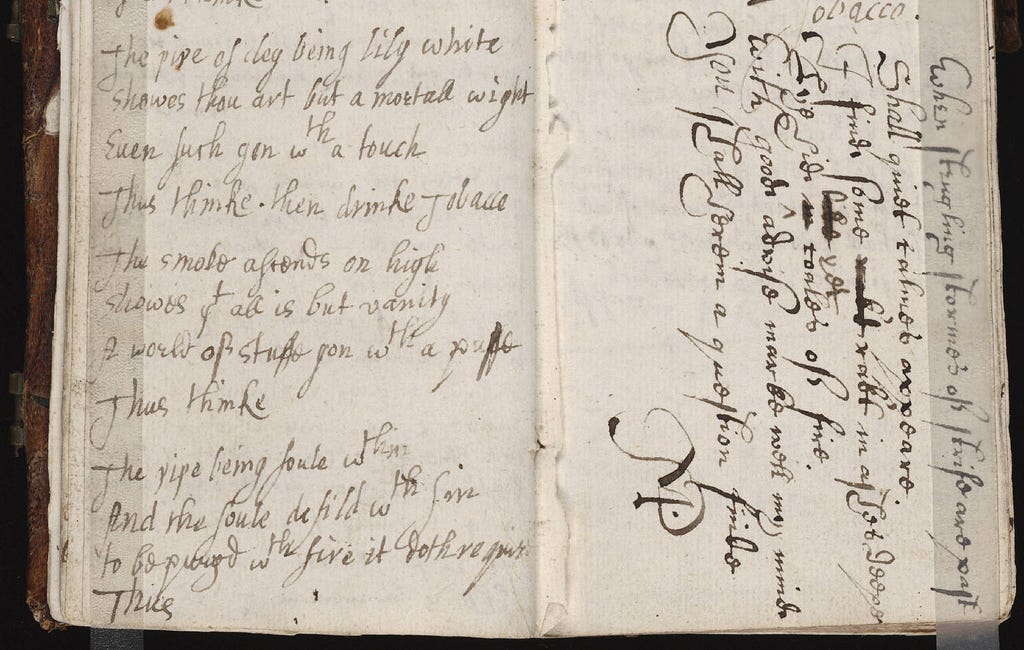I’m trying out a new monthly piece, which I intend to be a mid-month regular. For now, I’ll be removing the Commonplace section from my monthly digests and instead start offering a post dedicated to the practice of commonplacing and brief reflection. It’s an experiment, which means it may not survive the trial phase. My goal is to draw from my regular reading, but from time to time I may draw upon a previously squirrelled away commonplace. I’ve explained why I think commonplacing is a good practice in a previous post:
Tracing Beautiful Things
Have you ever tried to quote someone, but end up having to spend more time explaining how you’re getting it wrong from the outset? Has a conversation ever provoked a memory for you of something you once heard, and you’re certain it…
A Profane Book
I've tried to reduce profanity but I reduced so much profanity when writing the book that I'm afraid not much could come out. Perhaps we will have to consider it simply as a profane book and hope that the next book will be less profane or perhaps more sacred.
Ernest Hemingway, Ernest Hemingway: Selected Letters 1917–1961. Edited by Carlos Baker. New York: Charles Scribner’s Sons, 1981. p. 213.
Great Ideas: Poetry, Metaphysics, Habit, God
Hemingway’s little note here is about The Sun Also Rises, which strikes me as humorous given it is one of his books that is most concerned with the sacred. Of course, he’s focused on language and the perception of his characters in this letter. I think this could serve as a great case study on revitalizing the older sense of these words, and how they relate to time.
Keep Your Eyes Open
Indeed, don’t try to get there at all. It’ll happen when you’re not looking for it. And don’t talk too much about it even among yourselves. And don’t mention it to anyone else unless you find that they’ve had adventures of the same sort themselves. What’s that? How will you know? Oh, you’ll know all right. Odd things they say—even their looks—will let the secret out. Keep your eyes open. Bless me, what do they teach them at these schools?
C. S. Lewis, The Lion, the Witch, and the Wardrobe (1981) edited by Carlos Baker.
Great Ideas: Reasoning, Honor, Family, Prudence
I never tire of the Narnia series. I don’t know if that makes me childish, but even so, I hope I continue to learn from Lewis’s imagined world. This bit here is not something I’ve given too much thought before, but it stuck out on my latest read. It is of course broadly true, and applied to folks even if you’ve never physically been to Narnia. I think there is an overlap here with Lewis’s concept of Friendship in The Four Loves that is worth further exploration.
For That He Was Grateful
But he had business of its own kind in Faery, and he was welcome there; for the star shone bright on his brow, and he was as safe as a mortal can be in that perilous country. The Lesser Evils avoided the star, and from the Greater Evils he was guarded.
For that he was grateful, for he soon became wise and understood that the marvels of Faery cannot be approached without danger, and that many of the Evils cannot be challenged without weapons of power too great for any mortal to wield. He remained a learner and explorer, not a warrior; and though in time he could have forged weapons that in his own world would have had power enough to become the matter of great tales and be worth a king’s ransom, he knew that in Faery they would have been of small account.
J. R. R. Tolkien, Smith of Wootton Major. In Tales from the Perilous Realm. New York: HarperCollins, 2008. pp. 202-203.
Great Ideas: Prudence, Metaphysics, War & Peace, Good & Evil
I read this for the first time recently and found it be a marvelous little tale. I think the description of Smith here, “a learner and explorer, not a warrior,” is a designation I aspire to own. There are many warriors who do a fine job at their task, but I don’t see myself in that role. I’d much rather be like Smith, whose own story includes seeing the best in others and passing on his heritage to his family.
Governed By A Memory
“You have seen—the people of your capital have forfeited the freedom you won for them by sweat and blood; they have sold themselves to the slavers and the butchers. They have shown that they do not trust their destiny. Can you rely upon them for the winning back of your kingdom?”
“They thought I was dead,” he grunted, recovering some of his poise. “I have no son. Men can’t be governed by a memory.”
Robert E. Howard, The Hour of the Dragon. In The Bloody Sword of Conan. New York: Del Ray Books, 2003. p. 137.
Great Ideas: Government, Memory & Imagination, War & Peace, Fate
Howard has a deft hand in moments that strike me as far beyond his content. Much of the Conan and Kull stories is boilerplate, or even filler. But every now and then he puts brilliant quotes into the mouth of the barbarian king that are worth remembering. I think this idea itself is incredibly relevant to our political climate (and is likely always relevant). Indeed, men and women won’t be governed by a mere memory. So what will govern them?
There Needs To Be One Instance
Now that we have hunted across the woodlands and pastures of all Italy without finding the panther we are trailing, let us, in the hope of tracking it down, carry out a more closely reasoned investigation, so that, by the assiduous practice of cunning, we can at last entice into our trap this creature whose scent is left everywhere but which is nowhere to be seen.
Accordingly, I take up my equipment once more for the hunt, and state that in any kind of thing there needs to be one instance with which all others can be compared, against which they can be weighed, and from which we derive the standard by which all others are measured.
Dante Alighieri, De Vulgari Eloquentia. Translated and edited by Steven Botterill. Cambridge: Cambridge University Press, 1996. p. 39.
Great Ideas: Language, Poetry, Mathematics, Education
This metaphor of the hunt, representing the scholarly endeavor and perhaps the creative endeavor as well, is something I want to draw upon in future work. Dante’s entire corpus continues to pay dividends after many reads (this was my third time through De Vulgari but I had not marked this passage previously). What does it mean to hunt for that “one thing . . . by which all others are measured”?





